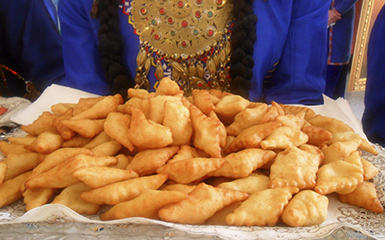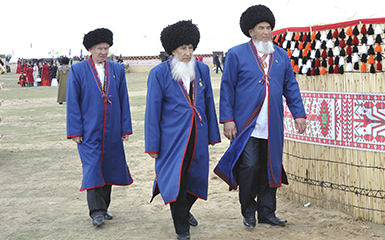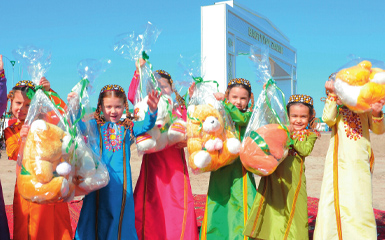This is what the ancestors of the Turkmen people used to say. A guest was considered a sign of God. Any person who came to aul (a Turkmen village) was offered shelter and food in the first yurt he/she came across. The traveller couldn’t refuse and leave the house without having tasted a warm meal.
Hospitality is characteristic of all Central Asian peoples, and the Turkmen people have it as a code of honour. Hospitality has always had a special meaning and rules, which include the norms of behaviour while visiting and receiving guests, as well as table setting and preparation of festive treats.
Lofty principles of traditional behaviour, including in hospitality and respect for the elders, were fostered from early childhood. These principles were followed during the family meal, where the traditional place of honour (in Turkmen ‘tor’) – opposite the entrance and near the hearth was taken by the elder of the family. This place was given to a guest, as soon as he crossed the threshold. At the same time, children got up from their seats, greeting and expressing their respect to the guest.
The traditional wedding is organized according to strictly established rules. It is a special festive ritual, which includes many customs and traditions associated with the people's idea of family prosperity, hard work, skills, ingenuity of newlyweds, strength of family and social ties. The wedding has always been the most joyous and solemn event, with traditional horse races, national wrestling called ‘goresh’, various national games and performances of singers – bakhshi and musicians. Moreover, the Turkmen wedding and its rituals are full of funny moments, including in taking the bride away from her native house, testing her dexterity and ability to untie the groom's gushak (belt) tied into a tricky knot with a bandage over her eyes, and many others. The wedding maiden songs, as well as the ditties sung by children who move from house to house according to the customs of Novruz (the national spring festival) are replete with wits.
To date, the centuries-old traditions are carefully preserved in modern life of the Turkmen people. For example, having attended a Turkmen wedding in the 21st century, people can see the most ancient rituals, hear folk songs, or take part in national games.


A number of rituals and sacrificial offerings are associated with the birth of a child in the Turkmen family. Thus, the unleavened flat cakes called ‘bogursaks’ are cooked and dispensed among the neighbours as a sacrificial offering before childbirth. A sadaqa in honour of deceased ancestors is given for easy childbirth. On the birth of the child and the first placing in the cradle, the maternal grandmother bakes pishme (cookies). When the child has the first tooth erupted, the parents prepare a feast and invite their relatives and neighbours with children. On the same day, grandmother prepares a festive treat from corn, so that the child's teeth grow as white as cornflakes. The day of the child's first haircut is celebrated even more magnificently. The circumcision ceremony symbolizing the boy's entry into adulthood is held just like a big festive event.
Aksakals (the elders) enjoy special respect and indisputable authority among the Turkmen people. This tradition, passed down from generation to generation, is carefully cherished in present-day Turkmenistan. A young person should show respect to the elder, start a conversation or sit down only with permission, speak gently and less than the elder, make a compromise, ignore the elder’s mistakes, fulfil the requests without demur, etc.
Respect for the elders is evidenced by many Turkmen proverbs and sayings, which contain unwritten rules: ‘Honour the elders, if you want to win respect’, ‘Those who love the father, love the Motherland’, ‘Gold and silver do not age, father and mother do not depreciate’ and others.
To date, the elders take an active part in the life of society and educate the young people; no agricultural work, construction, or celebration start without their blessing. The annual celebration of the International Day of Older Persons, which is included in the list of significant dates, demonstrates preservation of the ancestral traditions in Turkmenistan.


